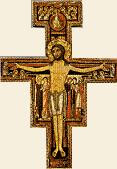
Disillusioned as a valiant knight after being wounded in battle, Francis had a profound experience of God in the broken–down church of San Damiano, which he visited one day. Face–to–face with the wounded and glorified Christ on the cross, Francis met the God of compassionate love, a God ‘bent over’ in love in the wounds of the crucified Christ.
Bonaventure describes this encounter in his Major Legend (1.6) where he writes: ‘While [Francis] was praying and all of his fervor was totally absorbed in God, Christ Jesus appeared to him as fastened to a cross.’ He indicates that there was no exchange of words. ‘His [Francis’] soul melted at the sight, and the memory of Christ’s passion was impressed on the innermost recesses of his heart.’
This encounter with the crucified God changed Francis in the very core of his being. Bonaventure states: ‘From then on he clothed himself with a spirit of poverty, a sense of humility, an eagerness for intimate piety.’ The expression of God’s self–giving love on the cross, impressed Francis in such a way that he began to change, marking the start of Francis’ spiritual journey.
The God whom Francis discovered in the cross of Jesus Christ was a God ‘who delights to be with the simple and those rejected by the world’ (Thomas of Celano, First Life, 12.31). Impressed by the love of the Crucified, Francis could no longer remain alone in his search for God. Rather, he had to find God in others: his neighbor, his brother and even the tiny creatures of nature.
The necessity of the other for Francis thrust him into radical poverty whereby everything that hindered his relation to the other was stripped away. Seeing God in the wounds of the Crucified drew Francis to a new level of compassion and to sharing his goods, his very self, with others.
Bonaventure writes that ‘to poor beggars he wished to give not only his possessions but his very self, sometimes taking off his clothes...ripping them in pieces to give to them’ (1.6). The encounter with Christ gave Francis a new openness and freedom. Embraced by the compassionate love of God, Francis was liberated within and went out to embrace others in love.
According to Bonaventure, Francis discovered his own identity through encountering the crucified Christ, that is, he discovered his own wounded–ness in the image of the crucified man. This self–knowledge enabled him to go out to the poor and sick.
Describing Francis as the truly humble person, Bonaventure writes: ‘As Christ’s disciple he strove to regard himself as worthless in his own eyes and those of others. He used to make this statement frequently: ‘What a person is before God, that he is and no more’’(6.1).
Naming the truth about himself before God freed Francis to make the journey to the other person and back again. Only in relation to the other did his weaknesses become strengths, for it was in naming his weaknesses that Francis matured in authentic human love.
Because of the mystery of Christ and the embrace of God’s compassionate love in the wounded Christ, Francis grew spiritually as a person, finding his true self to be a relational self. The deeper he grew in relationship with Christ, the deeper he grew in relationship with others.
As Francis deepened his relationship with Christ, the other became less for Francis an object and more a brother. Community became the concrete expression of the Christ mystery for Francis. The deeper he entered into the mystery of Christ in his own life, the more he recognized Christ in the world around him, in his brothers, the lepers, in the sick and in the tiny creatures of creation.
‘In all the poor,’ Bonaventure wrote, ‘Francis saw before him a portrait of Christ’ (8.5). Even animals represented Christ to him. Seeing the birth of a lamb, for example, Francis exclaimed, ‘Alas, brother lamb, innocent animal, always displaying Christ to people!’ (8.6).
Bonaventure highlights the idea that the one who dwells in Christ dwells in the other, because the fullness of who we are in Christ can only be found in the other. The difference of the other, therefore, was not an obstacle for Francis in his search for God but rather a celebration of God. For he found his own identity in God and he found God in the fragile, wounded flesh of his brothers and sisters.
It is prayer, according to Bonaventure, that impelled Francis to see the world with new vision, a contemplative vision that penetrated the depths of reality. The world became Francis’ cloister because he found it to be permeated with the goodness of God. Next....Jesus - Revelation of the Father











No comments:
Post a Comment